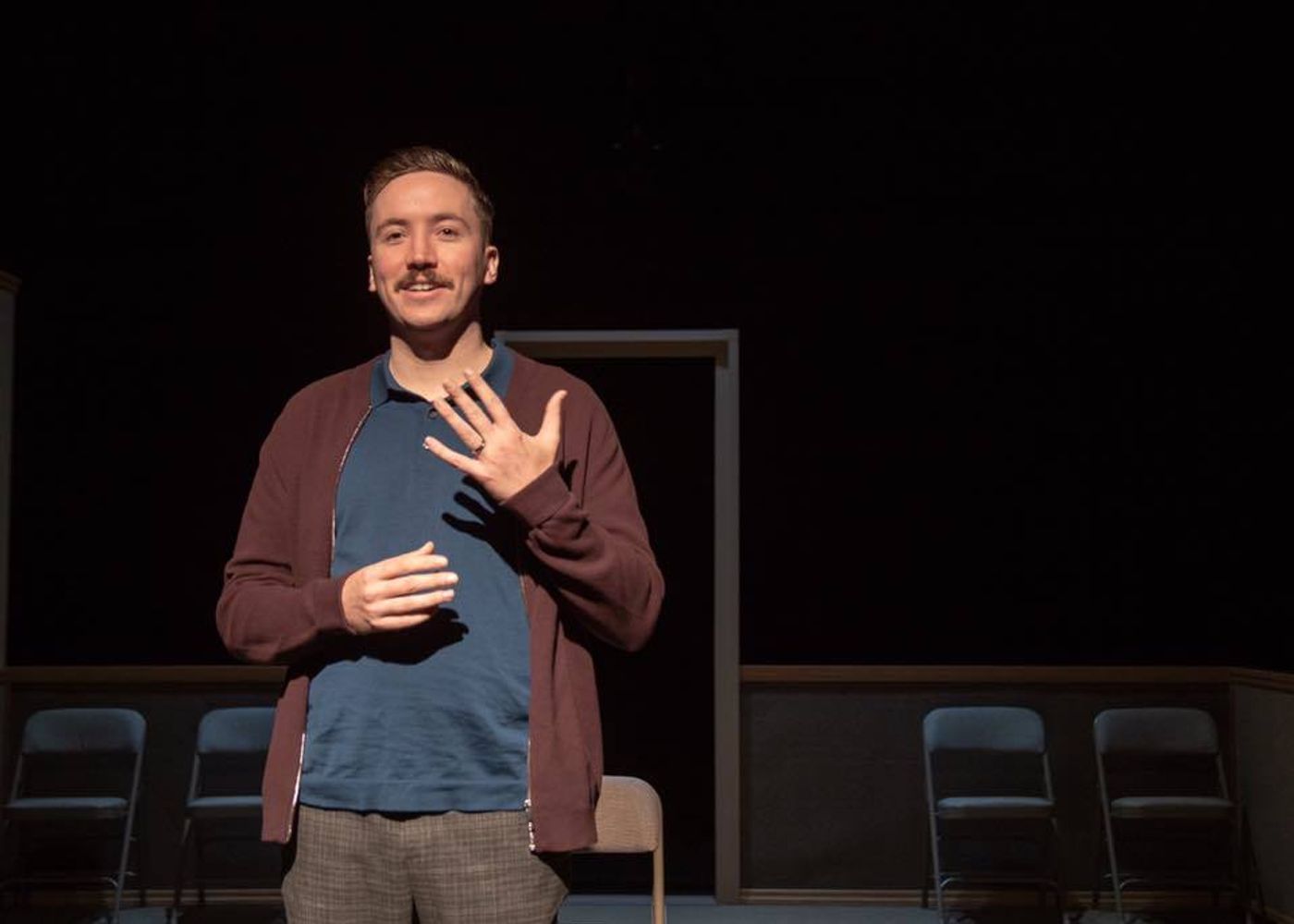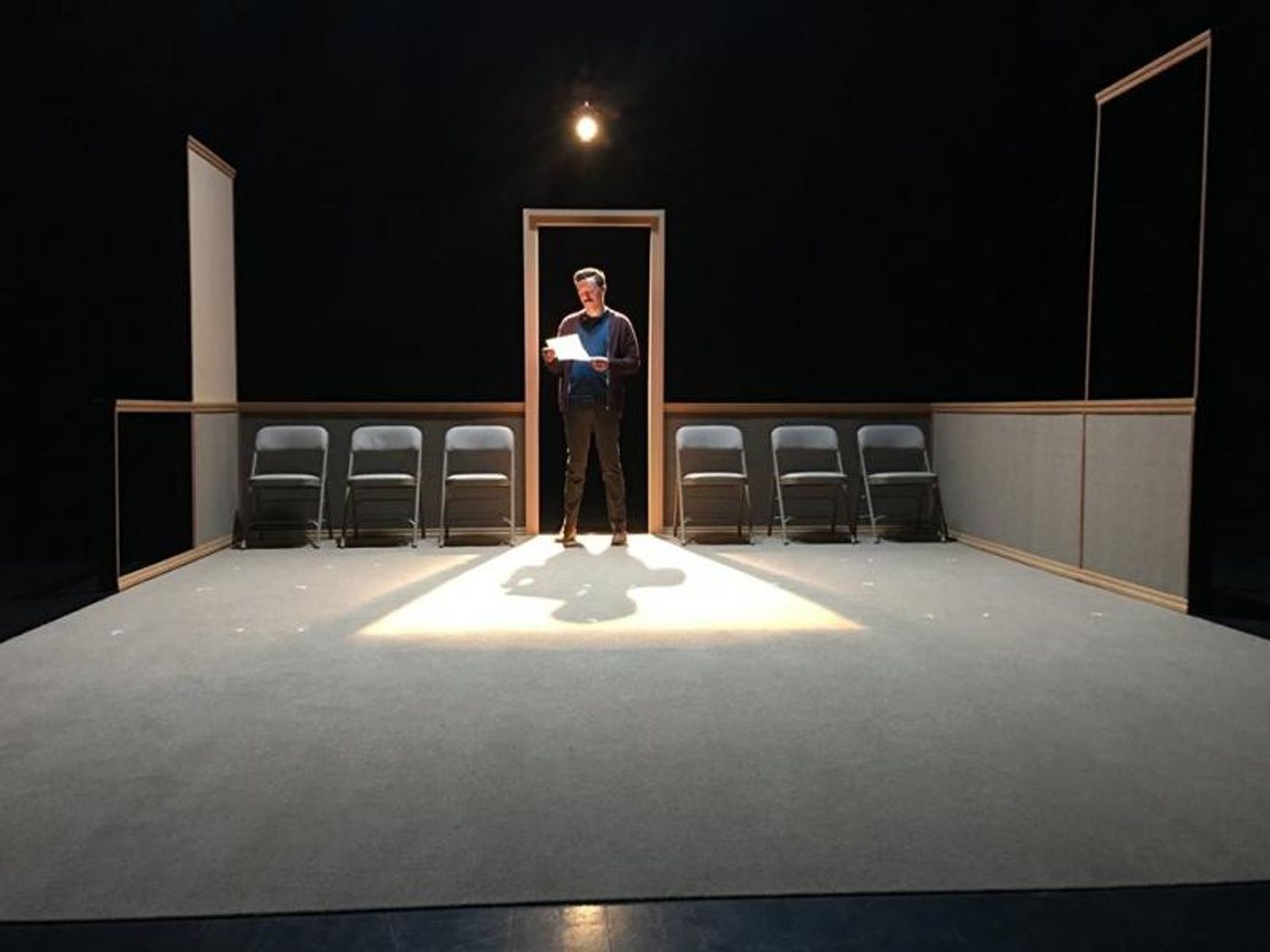Review: GOOD STANDING Premiere at Plan-B Theatre

The LDS Church fervently preaches that the family is foundational important. But its stoic, uniformed leaders seek out for persecution families that are headed by gay member partners.
Following delivery of a neatly typed form letter of invitation, a behind-closed-doors "church court" is held to determine worthiness for continued membership of these heads of households, frequently excommunicating and blotting from church records names of individuals who might otherwise be completely rules-following "in good standing" members contributing to church growth. These individuals become apostates, and their children are forbidden from baptism, a ritual ordinarily performed at age 8, until nearer to adulthood. And they must condemn their loving parents' relationship.
These ecclesiastic measures are at the center of the single-actor GOOD STANDING, the current Plan-B production. After reading to the audience his letter asking him to participate in the formal proceedings, Curt discusses his court hearing, with the actor (a stalwart professional Austin Archer) also taking on the roles of the 15 men -- a 12-member High Council, as its called, and the three men forming a geographical "Stake" governing presidency.
Archer is riveting, with innate acting skills few can match. Augmenting an impressive resume, he establishes an immediate bond with audience members in his typical genial though wholly committed fashion. I was anticipating a more forceful reaction given the final severity of these court actions, but with artistic director Jerry Rapier helming as director, Archer is restrained while wholly effective.
At 60-seat black box theaters, Plan-B proudly is "the only professional theater company in the U.S. producing full seasons of new work by local playwrights," with hopes of wider exposure through stagings outside of Utah. GOOD STANDING will be the company's fifth production to have an extended life in New York City when it is produced at the United Solo Theatre Festival, "the world's largest solo theater festival at Theatre Row on 42nd Street."
In that playbill, a dramaturg will need several pages to explain the LDS-centered GOOD STANDING. And the unique peculiarities of its rank-and-file members.
While other denominations aim to be inclusive and ordain gay clergy, Mormons remain staunchly homophobic, while professing love for the sinner and condemning the sin of gay love.
The bulk of GOOD STANDING introduces the antigay explanations of the council leadership. Curt rarely responds to the unapologetic beliefs of the LDS-branded sin of homosexuality, perhaps most strongly with "You got to hand it to that guy. It takes real balls to seem like a dick" retort. There is not much variety in the homogenized beliefs expressed by the leaders determining Curt's fate. Do we need
The audience barely understands Curt's position as a proud gay husband, beyond uncomfortably twirling his newly acquired wedding ring. Unpacked honeymoon luggage awaits his return to the couple's home.
Curt tells us "I've been loved, and that changes a person." How has he changed? Does he intellectually understand the reason for the court, while his heart yearns for understanding? Has his homosexuality been uncomfortably hidden until his wedding day, to appear faithful to church teachings? His father is entrenched in LDS doctrine, though he briefly laments not dancing with his son at the reception. Has their relationship been tempestuous before the wedding?
Is Curt a TBM (true believing Mormon)? Or does he join the Great Exodus leaving the church? How supportive/understanding is Curt's presumably LDS nonmember husband? (Only church members are allowed to participate as witnesses in these courts, and there's no mention of his husband's own pending court date.) Has Curt had an emotional reconciliation? Or does he counter-condemn the church?
As a former valiant Mormon who has sat at both sides of a church court table, I see much remains to be examined. (I still vividly remember the bewilderment of a woman on trial for faithfully loving a woman.)
Playwright Matthew Greene, who while closeted previously wrote Plan-B's 2013 drama "Adam and Steve and the Empty Sea," works hard to delineate the typical, frequently similar inner beliefs of LDS faithful on homosexuality, with little insight in to Curt's torments. Curt may be struggling to find Truth, or is he distancing from the church's untruthful beliefs?
The show plays through Oct. 28, and Sunday, Nov. 4, at the Studio Theatre at Manhattan's Theatre Row. The United Solo Theatre Festival is an annual international celebration for solo performances in its ninth season.
PHOTOGRAPHY BY RICK POLLOCK
Reader Reviews
Videos

